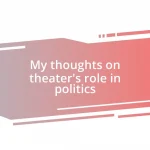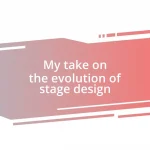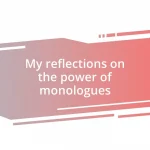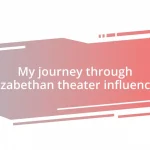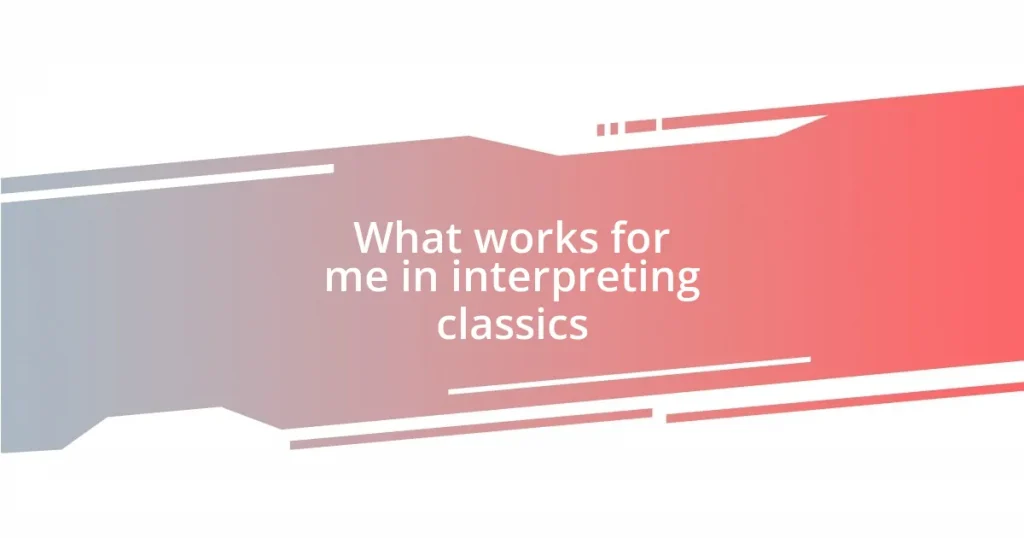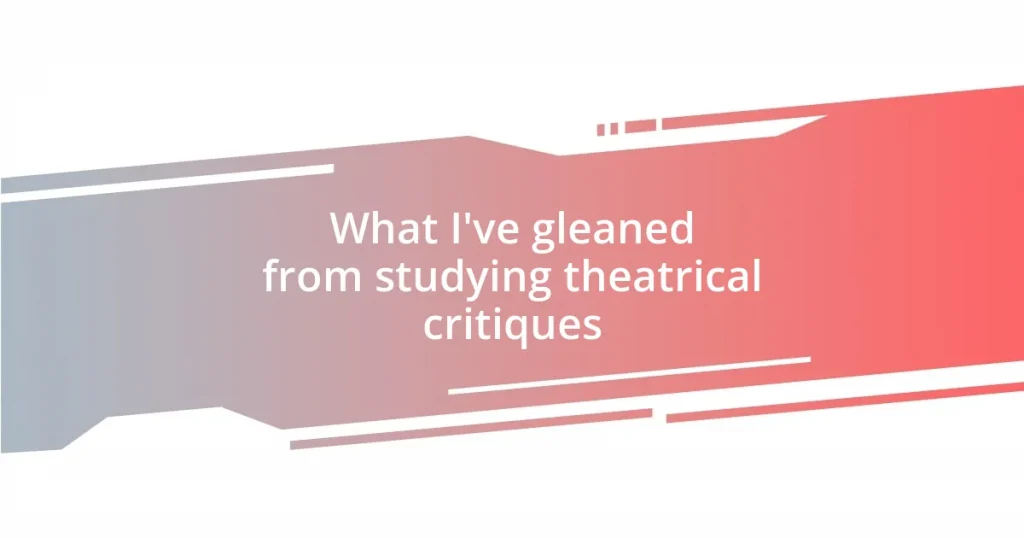Key takeaways:
- Greek tragedy explores timeless themes such as hubris, fate, and catharsis, which resonate with modern human experiences.
- Key plays like “Medea,” “Antigone,” and “Oedipus Rex” provoke reflection on deep ethical dilemmas, personal conflicts, and the pursuit of truth.
- Modern adaptations of Greek tragedy enhance relevance by connecting ancient themes to contemporary societal issues and personal dilemmas.
- Engaging with the emotional depth of these narratives prompts self-reflection and an examination of personal choices and moral values.

Understanding Greek Tragedy’s Relevance
Greek tragedy has a powerful way of resonating with our most basic human emotions. I still remember the first time I watched a performance of “Oedipus Rex.” The raw intensity of Oedipus’s journey felt so personal to me, making me question my own choices and the fate that surrounds them. Have you ever experienced a story that made you reflect on your own life? That’s the beauty of these ancient tales—they invite us to confront the complexities of our existence.
As I delve deeper into Greek tragedy, I find that the themes of hubris, fate, and catharsis are more relevant now than ever. In today’s fast-paced world, where our actions often carry monumental consequences, I can’t help but draw parallels between the struggles of the tragic heroes and the challenges we face. Isn’t it fascinating how these age-old dilemmas still mirror our modern predicaments? This ongoing relevance is what truly captivates me; it’s like these stories were meant to speak across centuries.
Moreover, the emotional depth of Greek tragedies often brings forth a sense of shared humanity. When I watch characters grapple with themes of love, loss, and justice, I can’t help but feel a connection to their plight. It stirs something within me, reminding me that we are all navigating similar storms in life. How can we not find meaning in such profound explorations of the human condition?

Personal Journey to Rediscover Tragedy
I distinctly remember flipping through an old book of Greek tragedies that had gathered dust on my shelf. The moment I picked it up, the familiar weight of nostalgia hit me. I found myself enthralled by the potency of the language, each word conjuring vivid images in my mind. It felt like I was visiting long-lost friends who were eager to share their dramatic tales once more.
- Rediscovering characters like Medea opened a floodgate of emotions for me.
- I felt her pain and rage so deeply; it resonated with moments in my own life.
- Attending a local theater’s rendition of “Antigone” made me appreciate the contemporary relevance of these narratives.
- As the actors delivered their powerful lines, I was transported back to my own struggles with decisions and consequences, highlighting the timeless nature of human experience.

Key Plays and Their Themes
When I think about the tragic masterpiece “Medea,” I can’t help but feel an intense rush of emotion. Here’s a woman scorned, taking her revenge in the most shocking way possible. Her struggle with betrayal and motherhood made me really reflect on deep emotional conflicts. How often do we face chaos within ourselves, pitting love against a thirst for justice? The power of her narrative resonates with anyone who has grappled with complex relationships, reminding us of the darker sides of human nature.
Another iconic play that strikes a chord is “Antigone.” When I first saw a live performance, it sparked a lively discussion in my mind about duty versus morality. I remember sitting in the theater, captivated as Antigone made her choice to honor her brother, even in defiance of the king. Isn’t it intriguing how we often rationalize our actions based on what we believe to be right? Just like Antigone, we may encounter similar ethical dilemmas in our daily lives, testing our beliefs and loyalties.
The tragedy of “Oedipus Rex,” of course, is the ultimate exploration of fate versus free will. I often find myself reflecting on Oedipus’s tragic flaw—his relentless pursuit of truth. It’s a stark reminder of how our quest for knowledge can sometimes lead us into dark territories, much like the secrets lurking in our own lives. Have you ever revealed something about yourself that changed everything? Oedipus’s story challenges us to consider the unseen consequences of our choices.
| Play | Themes |
|---|---|
| Medea | Betrayal, Revenge, Motherhood |
| Antigone | Duty, Morality, defiance |
| Oedipus Rex | Fate, Free Will, Truth |

Influential Greek Tragedy Writers
The trio of influential Greek tragedy writers—Aeschylus, Sophocles, and Euripides—profoundly shaped the landscape of literature with their compelling narratives. I recall a moment when I first delved into Aeschylus’s “The Oresteia.” The intricate web of revenge and justice struck me; it reminded me of family reunions gone awry, where secrets simmer beneath the surface. How often do we navigate the complexities within our own families, much like the characters in his plays?
Sophocles, on the other hand, is perhaps best known for his remarkable character development and emotional depth. When I read “Antigone,” I felt an intense connection to the struggle between personal conviction and societal expectation. It’s a theme I see reflected in everyday life—how frequently do we stand up for what we believe, even when the stakes are high? This play made me think about moments in my own life where I had to weigh personal ethics against external pressures.
Euripides brought a distinct humanism to tragedy, and his portrayal of strong female characters really resonated with me. While exploring “Medea,” I found myself contemplating the intense emotions and motivations driving her actions. Her story challenged the societal norms of the time, pushing me to reflect on how gender roles shape our own experiences. Are we truly free to express our emotions without societal constraints? That question lingered long after I closed the book, prompting me to examine my own vulnerabilities and relationships.

Techniques for Engaging with Tragedy
Engaging with tragedy requires an open heart and a willingness to confront uncomfortable truths. I remember one evening, sitting alone with a copy of “Medea,” and feeling the weight of her rage almost pull me in. It struck me how her emotional turbulence mirrored some of my own past frustrations—how often do we suppress anger when we should let it out? Reflecting on these emotions while immersed in tragedy can create a profound connection to our own inner struggles.
One technique I find particularly effective is watching live performances. The immediacy of seeing actors channel their characters’ passions makes the themes resonate more deeply. I’ll never forget the first time I saw “Antigone” staged. The energy in the room was palpable, and I found myself both rooting for and questioning Antigone’s choices. It made me consider how often we face moments that demand our principle over conformity. Do we have the courage to act on our convictions, even if it means standing alone?
Delving into the language of tragedy can also elevate your understanding and appreciation of the genre. When I tackled the poetic structure of Aeschylus, I was struck by how the rhythm and imagery enhanced the emotional gravity of the story. There’s something so compelling about how each word is chosen to evoke specific sentiments. Have you ever read a line that resonated so strongly it left you momentarily breathless? Engaging with the text in this way allows me not just to read but to feel and experience the heart of the tragedy.

Modern Adaptations and Interpretations
Modern adaptations of Greek tragedy open up a rich dialogue between the ancient and the contemporary. I recently watched a modern retelling of “Electra,” set in a contemporary urban environment. It was fascinating to see how the themes of revenge and familial conflict played out against the backdrop of today’s societal issues. The parallels were striking; I found myself questioning whether the motivations driving Electra still resonate with us today. Isn’t it intriguing how timeless these themes can be?
It’s also captivating to see how directors interpret these classic stories through different lenses. For instance, a production of “Medea” that emphasized the emotional toll of motherhood brought a fresh perspective to the narrative. I wasn’t just watching a tragedy; I was feeling the desperate strains of a parent caught between love and betrayal. How often do we find ourselves torn between our desires and our responsibilities? This adaptation forced me to confront similar dilemmas in my own life, making the story not just relevant but deeply personal.
The use of technology in modern adaptations is another thrilling dimension. I recall a performance of “Oedipus Rex,” where multimedia elements were integrated to illustrate the psychological turmoil of the characters. It struck me how effective these tools can be in conveying the anguish and horror inherent in the story. Have you ever experienced a moment where the visuals intensified the emotional weight of a narrative? That production left me pondering how our modern experiences of trauma can reshape our understanding of ancient stories.

Applying Lessons from Greek Tragedy
Applying lessons from Greek tragedy can be an enlightening experience that prompts deep self-reflection. I recall a particularly intense moment while reading “Agamemnon.” As I followed Clytemnestra’s motivations, I couldn’t help but think about the consequences of betrayal in my own life. It made me realize how crucial it is to address grievances openly rather than let them fester silently—how often have you seen secrecy lead to catastrophic outcomes?
Another valuable lesson lies in the moral dilemmas presented in these plays, which often resonate with our own choices today. A while back, I faced a challenging situation at work that put me at odds with a friend—much like the conflict between Creon and Antigone. The stark choices they made forced me to reflect on my own values and what I stood for. In those moments, I asked myself, do we prioritize friendships over principles, or is it possible to honor both?
Engaging with the tragic heroes’ flaws also reveals essential truths about human nature. For example, I was struck by Oedipus’s tragic blindness to the truth. It made me wonder: how often do we ignore signs in our own lives, believing we have everything figured out? There’s something humbling about recognizing that our imperfections can lead us down paths we didn’t intend to follow, reminding us to stay vigilant and self-aware.





